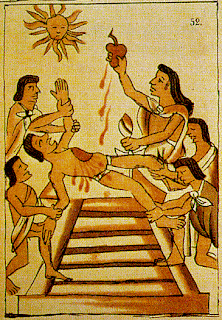On the chopping block
 I have not and will not sign any document authorizing donation of my organs. Why? Because I want to be good and dead not just brain dead. You cannot harvest organs from a corpse. Organs must be harvested from a body with a still beating heart and still functioning lungs.
I have not and will not sign any document authorizing donation of my organs. Why? Because I want to be good and dead not just brain dead. You cannot harvest organs from a corpse. Organs must be harvested from a body with a still beating heart and still functioning lungs.Once the heart stops, the body's tissues begin to suffer from oxygen deprivation, which deteriorates them (not to mention that lack of flowing blood also mean waste products can't be removed – further deterioration) and makes them less than useful.
The way organs are taken from bodies with beating hearts, is by declaring the person brain-dead with no chance for recovery. It is preferable that the decision be made quickly, since you don't want to harvest organs from someone who has been in a coma for months or years on end (again, because organs deteriorate). The best organs come from healthy young person involved in a car accident: "We're sorry, but your child is brain dead and will never recover. Please sign this authorization form allowing us to harvest the organs." (A few years ago, there seemed to be a rash of young people who died and their parents signed over the organs within 24 to 72 hours).
It was not surprising that the first human heart transplant occurred in South Africa. It was the heart of a black man (not truly a man in the eyes of Apartheid ruling elite), taken from his body after doctors declared him dead - though his heart and lungs were functioning (prior to that, the only acceptable definition of death was heart-lung failure). Yes, the notion of brain-death is something very recent in history - only about 40 years old.
I often wonder why we have the classification brain-dead, but not body-dead. Body-dead would be someone who has full mental faculties, but an injury renders their body incapable of functioning. An example would be Christopher Reeve, who, after his accident, could not even breathe without a ventilator.
Would it be ethical to harvest the organs of someone who is aware, but cannot breath without assistance?
Cutting the beating heart out of someone is no more humane today than it was when the Aztecs did it.
Image nabbed from here.

Comments
with my own family..yeah,im not sure if i would agree,but if the case is hopeless,sure,why not..
gosh,im having goosebumps here :D
ghee: there is no question that donating your organs and giving hope and life to others is a good thing. My main problem is that it depends on someone arbitrarily deciding that you will never recover consciousness and taking the organs from your still living body.
MOI: I disagree with heroic measures for sustaining life. I think life should pretty much be allowed to take its natural course. If it makes sense to do intravenous feeding or supply mechanical respiration, because there is a reasonable chance of sustaining someone over a hump until the body recovers, then fine. But, to simply do it because it can be done and it prolongs the inevitable ... erm, no.
I just have a problem with someone arbitrarily decinding I will not recover consciousness, especially knowing that it is preferable for a decision to be make quickly so the organs are as close to prime condition as possible and not deteriorated because I've been 6 months bedridden on artifical respiration.
I just want ot be dead because my heart no longer pumps and my lungs no longer take in air. If it means fading away, rather than going decisively.
kaymac: I think it is more a question of me not being able to stop thinking. Sometimes I think it is a curse and wish I could turn off my brain.
ok, my tots...
For christians who believe in the wonderful and eternal life after death, then death is non-threatening nor something to be fearful about. Like what Paul said in Philippians 1:21,
"For to me, to live is Christ and to die is gain."
That's why I do agree with tin-tin. :D